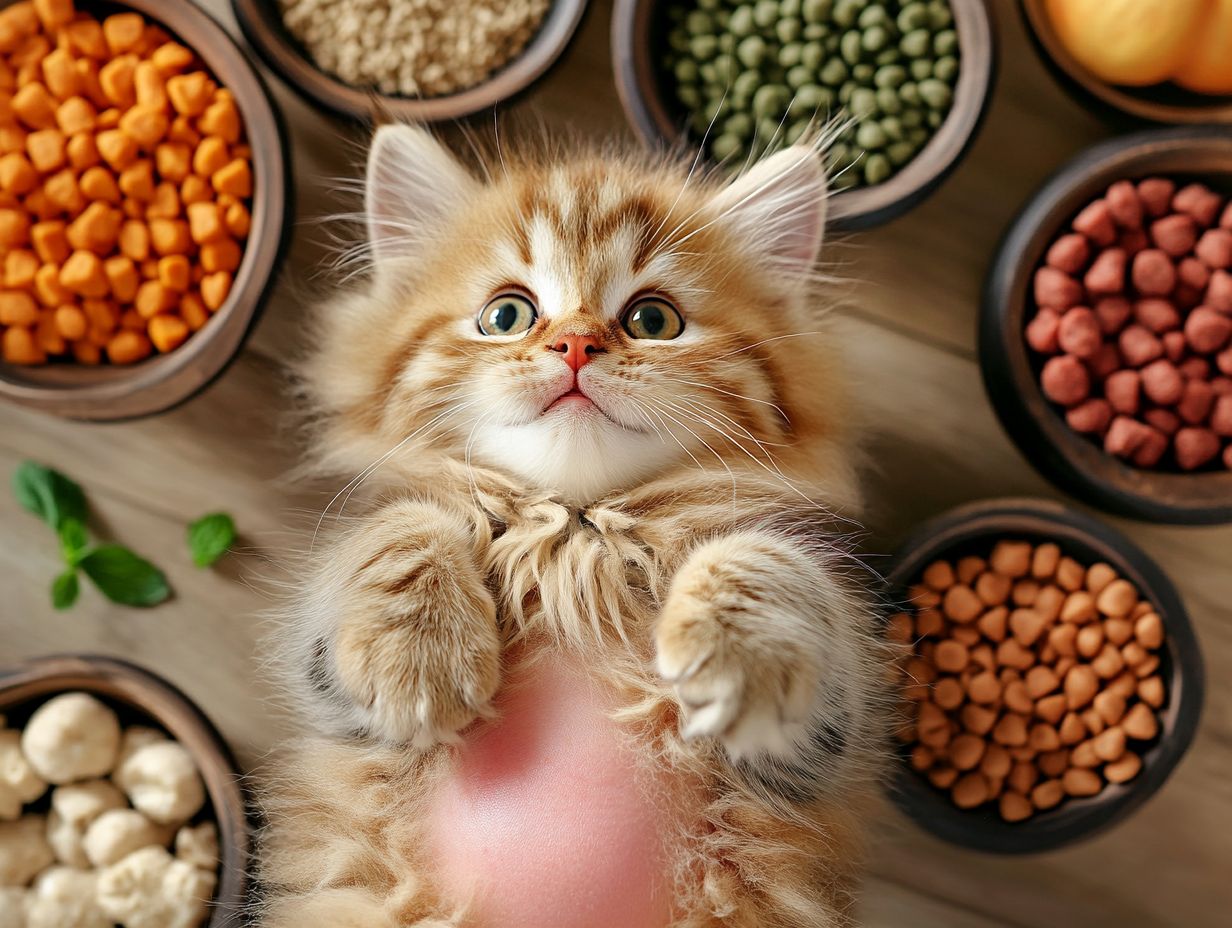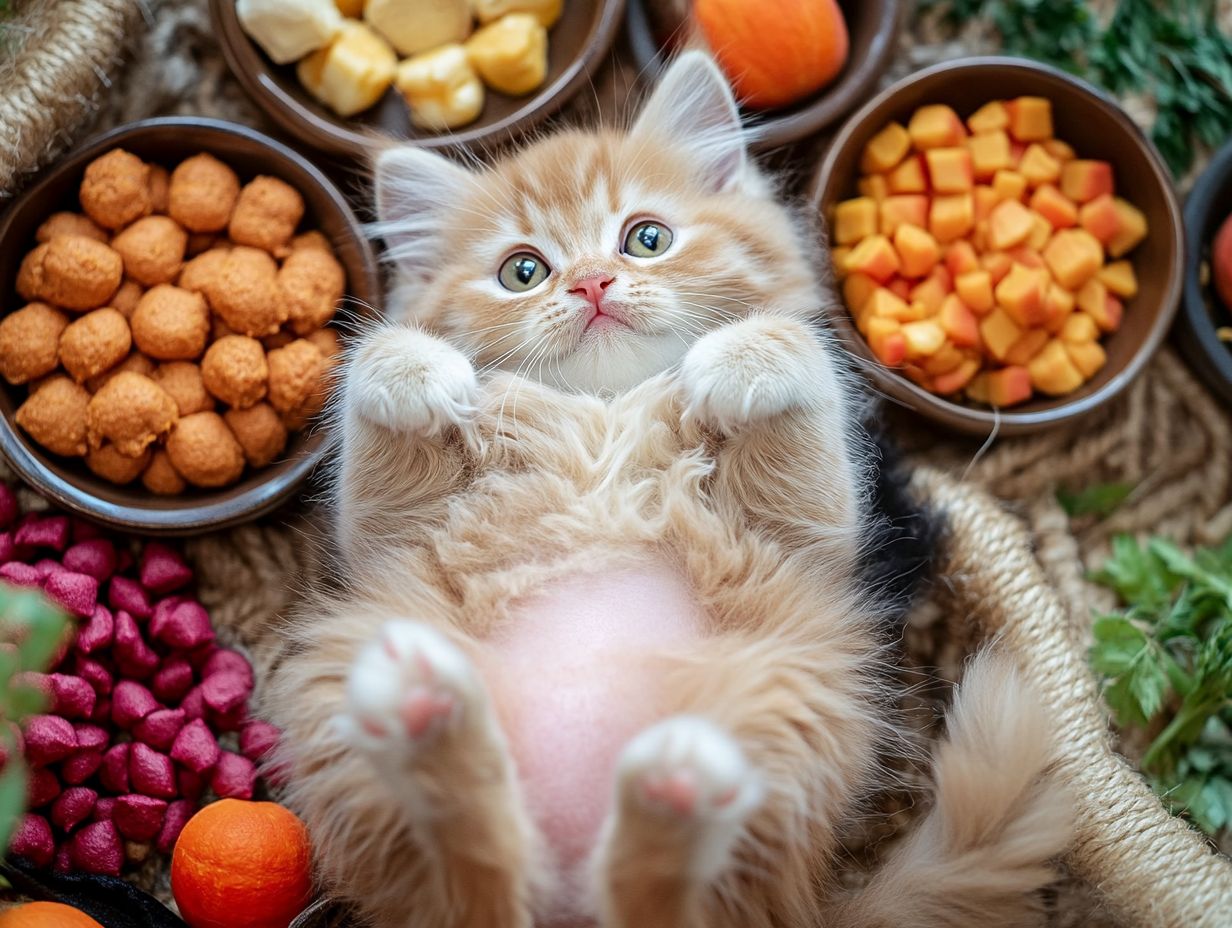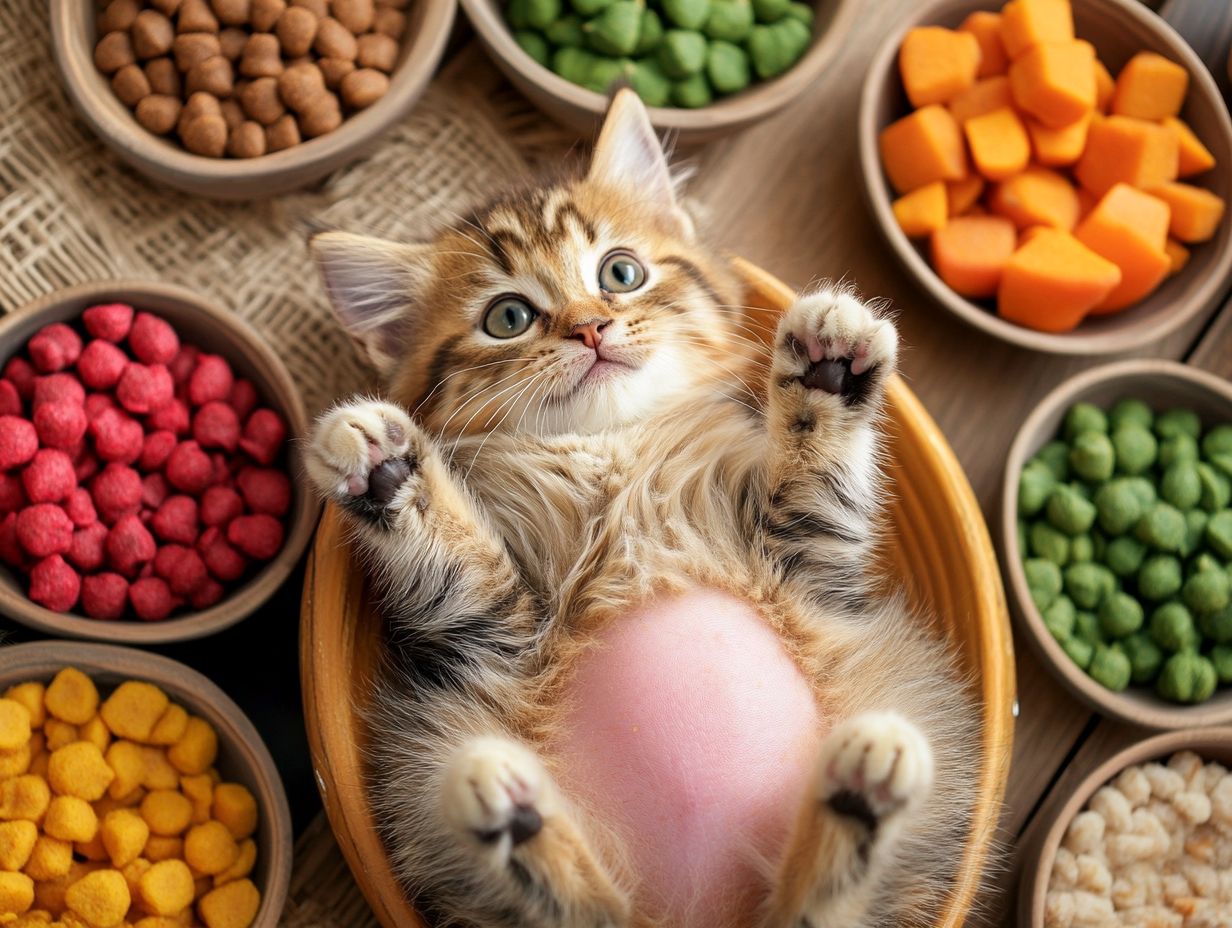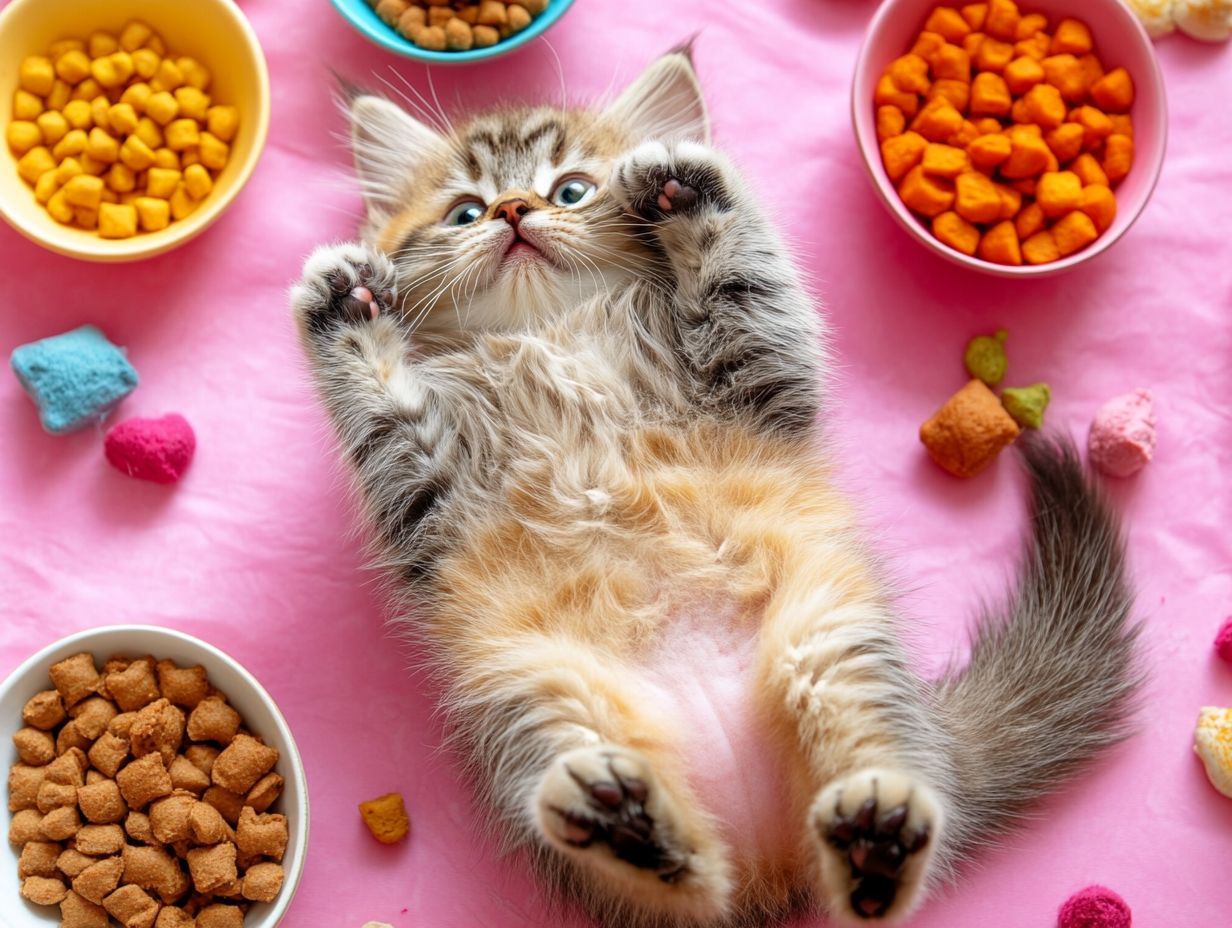Kittens are obligate carnivores, requiring a diet rich in animal-source proteins to support their growth and health. However, their delicate digestive systems can pose challenges for cat owners, particularly when addressing sensitive stomachs and food choices.
Many kittens experience sensitive tummies, which can lead to various gastrointestinal issues. From vomiting and diarrhea to constipation and loss of appetite, recognizing these signs early is crucial for their well-being and overall cat health. Any dietary changes should be made in consultation with a veterinarian to ensure the health and safety of your kitten.
Explore the best foods to support your kitten’s digestive health, including limited ingredient and hypoallergenic diets, what to avoid, and tips for smoothly transitioning to a new diet. Keep your little one happy and healthy with appropriate nutritional choices and veterinary advice!
Key Takeaways:

Why Do Kittens Have Sensitive Tummies?
Kittens have sensitive stomachs due to their developing digestive systems, the common gastrointestinal issues that arise during this stage, and the dietary changes they experience as they transition from their mother’s milk to solid food, including the introduction of both canned food and dry food.
This sensitivity can result in vomiting, diarrhea, and a refusal to eat. Understanding the physiological aspects behind these gastrointestinal disturbances is essential for ensuring proper cat nutrition and promoting overall health from a young age.
What Are the Signs of Digestive Issues in Kittens?
Kittens exhibit various signs of digestive issues that cat owners should be vigilant about. The most common symptoms include vomiting, diarrhea, constipation, and refusal to eat, all of which may indicate underlying gastrointestinal disturbances.
Early recognition of these symptoms enables timely consultation with a veterinarian and can lead to appropriate dietary changes, including dietary fiber sources, to enhance digestive health.
Is Your Kitten Vomiting?
Kittens are particularly sensitive to vomiting, which can be caused by factors such as food sensitivity, rapid eating, or irritation of the gastrointestinal tract. As a result, owners must closely monitor their kittens’ eating habits.
Vomiting in kittens is often linked to something they have ingested, making it essential to understand the contributing factors in order to manage the issue effectively. Dietary problems may arise from food intolerances to certain ingredients or sudden changes to new foods that their digestive system is unaccustomed to.
To minimize the risk of digestive upset, it is advisable for owners to gradually introduce new foods over a time frame of about 7-10 days and consult a qualified veterinarian. The veterinarian can provide an accurate diagnosis and recommend appropriate dietary changes, which may include easily digestible proteins, veterinary prescription diets, or hydrolyzed and hypoallergenic diets that help alleviate symptoms while ensuring optimal nutrition. Current veterinary research supports the effectiveness and safety of probiotics in aiding digestive health in kittens.
Is Your Kitten Experiencing Diarrhea?
Diarrhea in kittens can indicate underlying gastrointestinal issues and may be caused by dietary changes, food intolerances, or stress. It is important to consult a veterinarian for proper diagnosis and treatment, including dietary recommendations.
Understanding the difference between acute and chronic diarrhea is essential for determining appropriate solutions. Acute diarrhea typically resolves quickly, while chronic diarrhea persists over a longer period, often indicating serious health concerns. Veterinary guidance is crucial for making informed dietary changes based on the type of diarrhea.
Diet plays a crucial role in maintaining optimal gastrointestinal health; implementing limited ingredient diets can help identify specific food intolerances and reduce their occurrence. Additionally, sources of dietary fiber that are safe for kittens, including omega-3 fatty acids, can enhance digestive function by regulating bowel movements and promoting a healthy gut environment. These dietary approaches can effectively manage diarrhea and contribute to the healthy growth of kittens.
Is Your Kitten Constipated?
Constipation in kittens can arise from a variety of factors, including inadequate dietary fiber, dehydration, or underlying health issues. To prevent constipation, ensure your kitten has access to fresh water and a balanced diet that includes appropriate sources of dietary fiber.
Safe sources of fiber for kittens may include pumpkin puree or specific commercial kitten foods formulated to promote digestive health. Monitoring your kitten’s litter box habits can help identify any issues early on, enabling timely veterinary consultations if needed.
Constipation in kittens can be a concerning sign of potential digestive issues and may be caused by factors such as a lack of dietary fiber, dehydration, or stress. Therefore, it is essential for cat owners to ensure their kittens receive proper nutritional value in their diets, including moisture content from canned food. While cats are obligate carnivores, a small amount of fiber can support digestive health. Beneficial types of fiber include pumpkin and psyllium, which can aid in digestion.
Recognizing the symptoms of constipation, such as straining or producing hard, dry stools in the litter box, can aid in the early diagnosis of this condition. Veterinary care is crucial for identifying the underlying causes of constipation, as other potential factors include lack of exercise and certain medical conditions, highlighting the need for a comprehensive approach to digestive health, including regular veterinary input.
Increasing dietary fiber can help regulate bowel movements by adding bulk to the stool and aiding in water retention for easier passage. However, it is advisable to consult a veterinarian before making significant changes to a kitten’s diet, especially when addressing constipation or feeding issues. Regular veterinary visits are necessary to evaluate a kitten’s diet, enabling professionals to recommend appropriate changes that support good digestive health and overall well-being, addressing potential health concerns.
Is Your Kitten Refusing to Eat?

Kittens refusing to eat is a common indication of gastrointestinal disturbances in young cats and can often be attributed to food preferences, stress, or underlying medical issues that require veterinary attention. This lack of appetite may not be a temporary problem and can lead to serious health consequences if left unaddressed. Therefore, understanding the reasons behind their poor appetites, including potential cat allergies, is essential. Signs of dehydration, such as lethargy or dry gums, should also be monitored, and ensuring adequate hydration is critical.
Some kittens may avoid their current food due to dislike for its texture or taste, while others may be stressed due to changes in their environment. To encourage them to return to their normal feeding habits, guardians can gradually introduce new high-quality protein sources or mix in some wet food that they enjoy to enhance the flavor of their existing food, ensuring they meet their nutritional requirements. It’s important to make these transitions gradually to avoid exacerbating gastrointestinal issues.
What Are the Best Foods for Kittens with Sensitive Tummies?
The best foods for kittens with sensitive stomachs are those that support healthy digestion. Easily digestible protein sources, limited ingredient diets, and veterinary prescription foods, such as those from Royal Canin, Purina, or Natural Balance, should be used under a vet’s guidance, emphasizing the need for tailored nutritional advice and can significantly enhance the overall health and gastrointestinal comfort of kittens experiencing digestive issues.
1. Easily Digestible Proteins
Easily digestible proteins are essential for kittens with sensitive stomachs, as they help reduce the risk of food allergies and support healthy gastrointestinal function, both of which are critical for proper growth and development.
Specialized kitten formulas and veterinary prescription diets can significantly enhance the digestibility of diets for these young animals. Such diets may contain hydrolyzed proteins, which are broken down into smaller, more easily digestible molecules that the digestive system can process more effectively, addressing food allergies and intolerances.
These diets can be tailored to meet specific dietary requirements while ensuring that appropriate nutrition is provided without negatively impacting the digestive system. By offering these specially formulated and nutrient-rich sources, pet owners can help promote the overall health of their kittens, providing them with the energy and vitality they need, addressing common cat health concerns.
2. Probiotics for Gut Health
Probiotics play a crucial role in kitten health by promoting gut health, balancing the microbiome in the digestive tract, and reducing gastrointestinal issues. These microorganisms are essential components of a kitten’s diet, as they aid in nutrient absorption, strengthen the immune system, and even influence behavior through the gut-brain axis, addressing issues like feline asthma and hairballs.
Kittens particularly benefit from a healthy gut microbiome during their critical growth phase. Various types of probiotics are available, including yeast-based options and strains of bacteria such as Lactobacillus. They can be found in forms like powders, capsules, or treats. However, probiotics should be selected carefully and only under veterinary advice, especially in the context of specific health issues.
It is advisable for pet owners to consult a veterinarian before introducing probiotics, especially when altering diets or during recovery from illness, as personalized recommendations can help ensure optimal results for their growing kittens. Additionally, monitoring portion control and weight in kittens, particularly those with sensitive stomachs, is essential for managing overall health and preventing obesity. Owners should also be aware of spoilage in food, looking for visual cues and odor changes to ensure safe feeding practices.
3. Limited Ingredient Diets
Limited ingredient diets are beneficial for kittens with food sensitivities, as they reduce the number of potential food irritants and aid in identifying specific allergens while still meeting essential nutritional needs, providing a scientifically formulated feeding approach. It is important to ensure that these diets meet AAFCO standards for complete and balanced nutrition.
These diets differ from traditional ones by featuring fewer ingredients, resulting in a simpler nutritional profile that emphasizes higher-quality proteins and carbohydrates. For authoritative information on dietary management for sensitive stomachs, consult veterinary resources rather than commercial products.
For pet owners looking to transition their kittens to a limited ingredient diet, it is advisable to do so gradually. Mixing the new food with the old diet and slowly increasing the amount of the new food over several days can help avoid digestive upsets and allow the kitten’s palate to adjust. If any reactions occur during this adjustment period, they can provide valuable insights into which ingredients are best tolerated by the kitten’s digestive system.
4. Homemade Diets
Homemade diets offer cat parents the ability to control the sources of ingredients and the nutritional value for their kittens, enabling them to customize the diet according to specific needs and to eliminate common food irritants and allergens. However, it is crucial to ensure that homemade diets are properly balanced to avoid nutritional deficiencies, and it is advisable to consult with a veterinarian before making any significant changes.
Balanced recipes that provide the appropriate amounts of essential vitamins and minerals for a growing kitten are crucial. These recipes should adhere to guidelines from veterinary nutritionists and include high-quality sources of protein, such as chicken or fish, along with healthy carbohydrates and fats. For instance, ground turkey can be combined with spinach and pumpkin to create a meal that is rich in fiber and nutrients.
Since each kitten is unique, it is vital to consult a veterinarian before making any significant changes to their diet. This consultation can provide insights into portion sizes, specific nutritional requirements, and ensure that the diet supports the kitten’s growth and overall health as an active and playful companion.
What Foods Should Be Avoided for Kittens with Sensitive Tummies?

Identifying the foods that should be avoided for kittens with a sensitive stomach is essential for preventing gastrointestinal issues and ensuring their overall health and comfort. Consulting with a veterinarian before making dietary changes is particularly important for kittens with known sensitivities or health conditions.
1. Dairy Products
Dairy products can be harmful to kittens, as many of them are lactose intolerant. While some kittens may tolerate small amounts, caution should always be exercised, as intolerance can lead to digestive issues such as diarrhea and vomiting, which can significantly impact their gastrointestinal health.
The condition arises because their digestive systems lack lactase, the enzyme needed to break down lactose found in cow’s milk and other dairy products. When kittens consume these products, they may experience discomfort that affects their appetite and overall well-being.
Instead of dairy, it is recommended to feed specially formulated kitten foods that are compliant with AAFCO standards to ensure they receive the essential nutrients without any risks. High-quality wet or dry kitten food provides proteins, vitamins, and calcium while promoting easier digestibility. For more information, check out Sensitive Kitten Tummies: Best Foods for Digestive Health.
Additionally, there are lactose-free milk alternatives designed specifically for young felines, allowing them to enjoy the pleasures of dairy without the harmful effects.
2. Foods High in Fat
High-fat foods can cause digestive disturbances in kittens and are often responsible for gastrointestinal issues in infants, such as diarrhea and obesity, which can hinder proper growth and development. Additionally, these foods may lack nutritional quality, making it challenging for growing kittens to obtain the essential nutrients they need.
Examples of high-fat food sources that are easy to overfeed include fatty meats and dairy products, which can place undue stress on a kitten’s sensitive gastrointestinal system. It is essential to maintain moderation and consult a veterinarian for specific dietary needs related to obesity or rapid growth.
Furthermore, proper food storage is crucial to prevent spoilage, especially when preparing homemade diets.
Instead, feeding appropriate protein sources, such as lean chicken or turkey, is a better option. High-quality commercial kitten formulas specifically designed to provide the necessary calories without excessive fat are also excellent choices. Ensure these formulas are verified for AAFCO approval to meet balanced nutritional needs. These options help promote healthy weight gain while meeting the rapid growth demands and playful activities of kittens.
3. Human Food Scraps
Feeding kittens human food scraps can lead to various gastrointestinal disturbances, such as diarrhea and vomiting, and disrupt their dietary needs, making it essential for cat parents to adhere to proper kitten feeding guidelines and consider cat nutrition from professional sources like Royal Canin or Purina. Additionally, it’s important to note that certain human foods can be toxic to cats, such as onions and garlic, and should be avoided.
Offering unnecessary human food can cause discomfort, allergies, and even severe reactions, as kittens have sensitive digestive systems. Unlike adult cats, growing kittens require precise nutrients that cannot be obtained from scraps, which are often high in salt, sugar, or unhealthy fats.
This not only jeopardizes their growth but may also set the stage for long-term health issues. For optimal health and nutrition, it is far better for owners to provide specially formulated kitten diets that meet their specific dietary requirements.
How to Transition Your Kitten to a New Diet?
Transitioning a kitten to a new diet is important, but it should be done carefully and patiently. Sudden changes can cause gastrointestinal upset or lead to a refusal to eat. Therefore, a gradual food transition, guided by veterinary recommendations, is essential. Consulting a veterinarian before making dietary changes ensures it meets your kitten’s individual health needs.
1. Slowly Introduce New Food
New food should be introduced into a kitten’s diet gradually to minimize the risk of digestive upset. This gradual transition allows their gastrointestinal tract to adjust slowly to the differing dietary composition of the new food.
2. Mix Old and New Food Together

Combining old and new food is an effective strategy for transitioning kittens to a new diet, helping them adapt to different flavors and textures while reducing the risk of digestive issues. This gradual blending not only encourages a more adventurous palate but also helps prevent unexpected stomach upset.
To ensure a smooth adjustment, it is essential for caregivers to maintain a regular feeding schedule, which provides kittens with a sense of security and routine, helping to regulate their metabolism. Ideally, this gradual approach should involve mixing increasing amounts of the new food over several days, allowing the kittens to become familiar with their changing diet.
By paying attention to their preferences and digestive responses, this method can make mealtime a more enjoyable experience for both the kittens and their owners.
3. Monitor Your Kitten’s Reaction
Monitoring your kitten’s response to a new diet is crucial. If you observe any signs of digestive distress, such as vomiting or diarrhea, it’s important to reassess their diet and consider consulting your veterinarian.
To facilitate this process, maintaining a feeding journal can be helpful. In this journal, you should record the types of food given, the amounts of each new food introduced, and any changes in behavior or bowel movements. By keeping a detailed record, you can easily identify any negative responses that may coincide with dietary changes.
If the negative symptoms persist for a few days, or if you notice other concerning symptoms, such as excessive lethargy, you should seek veterinary assistance.
Frequently Asked Questions
What are sensitive kitten tummies?
Sensitive kitten tummies refer to digestive systems that are easily upset by certain foods, leading to issues such as vomiting, diarrhea, and constipation. They may also be prone to food allergies and hairballs if not properly managed. Always consult with a veterinarian for personalized advice.
How do I know if my kitten has a sensitive tummy?
If your kitten frequently experiences stomach upset, bloating, or changes in bowel movements, it may be a sign of a sensitive tummy. Consult with a veterinarian if you have concerns.
What are the best foods for sensitive kitten tummies?
The best foods for sensitive kitten tummies are those that are easily digestible, have limited ingredients, and are free of potential irritants such as grains and artificial additives. Consultation with a veterinarian is recommended for tailored advice.
Are there any specific ingredients I should look for in food for sensitive kitten tummies?
Yes, look for high-quality animal-source protein sources, such as chicken or lamb, as these are crucial due to cats’ obligate carnivore nature. Additionally, while easily digestible carbohydrates like sweet potatoes or peas can be included, be cautious of feeding too many carbohydrates, as they can lead to health issues.
Can I feed my kitten homemade food for their sensitive tummy?
While homemade food may seem like a good option, it must be carefully formulated to meet AAFCO standards for kitten nutrition. Consult with a veterinarian or a pet nutritionist and use recipes vetted by veterinary nutritionists to ensure your kitten’s diet is balanced. Be aware of the potential risks of nutrient deficiencies associated with homemade diets, and encourage regular veterinary check-ups to monitor your kitten’s health.
What if my kitten refuses to eat the recommended food for their sensitive tummy?
If your kitten is refusing to eat the recommended food, try gradually introducing it into their diet by mixing it with their current food. You might consider offering different flavors, such as chicken, turkey, or fish, and varying textures, like pâté or kibble, to see what your kitten prefers. It is important not to force food and to monitor for signs of health issues if the refusal persists. If they continue to refuse to eat, consult with a veterinarian for further guidance. Additionally, remember that sudden changes in diet can lead to gastrointestinal upset, reinforcing the need for gradual transitions. In cases of specific health issues, such as a sensitive stomach, consider prescription diets and consult a veterinarian for tailored recommendations. Lastly, ensure proper food storage practices for homemade diets to avoid spoilage and contamination.